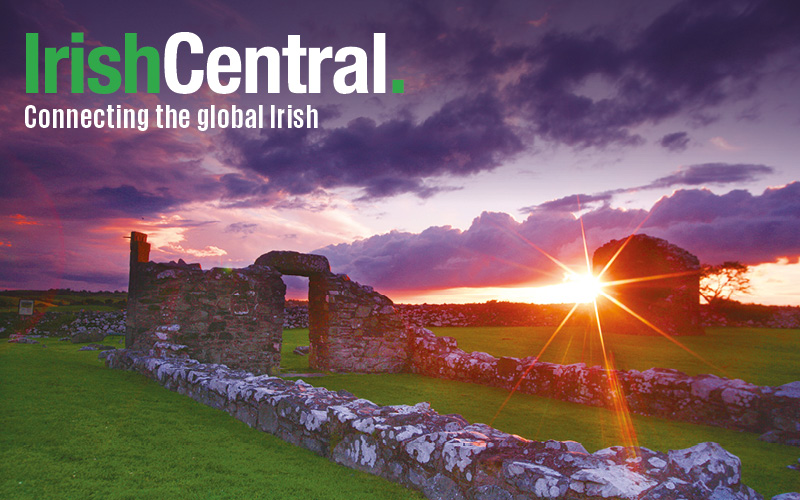Theodore Martin Hesburgh was more Irish than his last name might suggest.
The long-time president of the University of Notre Dame and Holy Cross priest for nearly 72 years always thought he resembled his mother—christened Anne Marie Murphy—more than his father, Theodore Bernard Hesburgh, whose family immigrated from Luxembourg.
A highlight of his final years—Father Hesburgh died Feb. 26, 2015—was St. Patrick’s Day in 2012. Taoiseach Enda Kenny came to the Notre Dame campus in northern Indiana to give Hesburgh an Irish passport, meaning the 94-year-old now possessed dual American and Irish citizenship.
At the ceremony, which featured remarks by Hesburgh’s close friend Donald Keough, chairman emeritus of the Notre Dame Board of Trustees and former CEO of the Coca-Cola Company, the priest reflected on the strong connections between Notre Dame and Ireland. The ties, he explained, went well beyond the nickname of the school’s athletic teams: the Fighting Irish.
“It’s a link at the heart of all that we are,” said Hesburgh, who served as Notre Dame’s president from 1952 to 1987, “and I think it’s at the heart of all that we aspire to be.”
In Hesburgh’s case, the link was both institutional and personal, extending to his mother and her father, Martin Murphy, who came to the U.S. from Ireland as a child.
Shortly after Hesburgh passed away, I thought there might be some value to future biographers and historians if I brought together accounts of lengthy interviews I conducted with him over several decades. The recently published book—a “biographical memoir” in my classification—is titled "Fifty Years with Father Hesburgh: On and Off the Record."
As I looked back at a half-century of watching and working with him, I was struck, again and again, by the variety of experiences in his life and the centrality of his faith (as well as moral concerns) to everything he did.
Besides being known as one of America’s most respected leaders in higher education, he also found time for public service and religious assignments that made him a frequent visitor to Washington, Vatican City and elsewhere across the globe.
He received 16 presidential appointments between 1954 and 2001, notably as a charter member and later chairman of the U.S. Civil Rights Commission as well as the first priest to be named an ambassador for leading the American delegation to a United Nations conference on development.
From 1956 to 1970, he was the Vatican’s representative to the International Atomic Energy Agency in Vienna, and in 1974 he was appointed as a member of the Holy See’s U.N. delegation.
In the 1960s, a decade after becoming Notre Dame’s president and beginning what he called his other “jobs” away from campus, Hesburgh started to receive honors and other recognition. President Lyndon Johnson awarded him the nation’s highest civilian accolade, the Medal of Freedom, in 1964, two years after he was the subject of a Time magazine cover story. He received the Congressional Gold Medal in 2000, and in 2002 he was given his 150th honorary degree, a Guinness World Record.
During our interviews, no subject was ever off limits. Father Hesburgh would speak with candor about world leaders he knew, and he discussed controversial topics by examining the moral questions they raised. At a time when our politics and civic life have become so polarized, he sought to bridge differences whenever that was possible and to operate from the center.
Despite macular degeneration that robbed him of most of his sight in later years, Hesburgh never lost his vision for improving Notre Dame, for advancing civil rights and for supporting world peace. As he got older, he adopted a credo that he often repeated and sought to live by: “Do as much as you can, as well as you can, as long as you can, and don’t complain about the things you can no longer do.”
Until his last few weeks, Hesburgh continued to go to his office on the 13th floor of the Hesburgh Library seven—yes, seven—days a week. Students read newspapers or books to him, and an endless stream of undergraduates, alumni and others stopped by for a chat or a blessing.
The final quarter-century of his life he enjoyed simply being “Father Ted,” the grandfatherly figure that most people on campus readily recognized. After a career of racing to meetings and other commitments on every continent, he was content to be at home at Notre Dame. He had more time, even for a curious journalist-cum-academic who regularly stopped by to talk—on and off the record.
Among his many talents, Hesburgh was a gifted storyteller. For instance, he liked to explain the meaning of the rosary, but he did it in personal terms.
“...Catholics have a thing called the rosary, which is a kind of repetition of the Our Father then ten Hail Marys and it’s, in a way, almost like something Eastern religions call a mantra,” Hesburgh said. “But in a way, saying the rosary, very often, like last night, I didn’t get through it. I mean I wake up in the middle of the night and sometimes there’s the rosary there and I fell asleep. When I was a youngster my Irish mother used to say, just say the rosary every night and if you fall asleep, the angels will finish it for you. It’s funny, but that’s an Irish mother for you.”
That’s just one story from someone who always took pride in his Irish heritage and in Notre Dame’s enduring ties to Ireland.
* Robert Schmuhl is the Walter H. Annenberg-Edmund P. Joyce Chair in American Studies and Journalism at the University of Notre Dame and author of "Ireland’s Exiled Children: America and the Easter Rising" (Oxford University Press). His new book, "Fifty Years with Father Hesburgh: On and Off the Record," has just been published by the University of Notre Dame Press.
Read more: Notre Dame coach nixed from public engagement, massively anti-immigrant




Comments